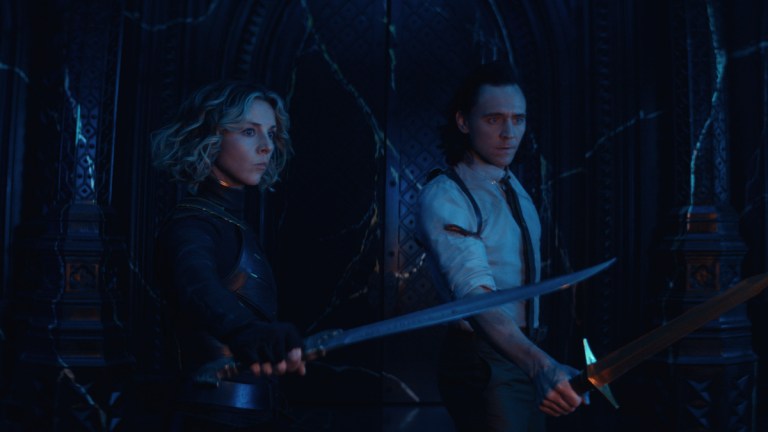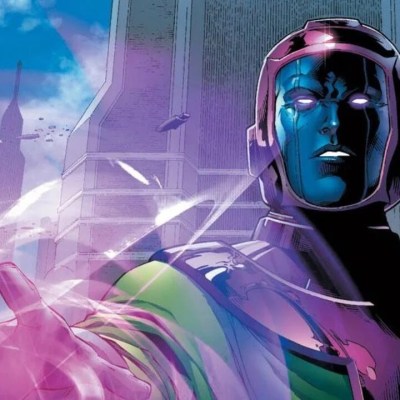Marvel’s Loki Episode 6: MCU Easter Eggs and Comics References
Marvel's Loki episode 6 is a massive season finale that has even bigger ramifications for the future of the MCU. Oh, and did we mention all the Easter eggs?

This article contains Loki episode 6 spoilers, and potential spoilers for the wider MCU.
The Loki season finale (and thanks to the mid-credits scene we know it’s a “season finale” not a “series finale,” thank Odin) is here, and it’s got bigger ramifications for the Marvel Cinematic Universe than we ever could have imagined. Loki episode 6 may be light on Marvel Comics Easter eggs (and after last week’s egg-fest, don’t get greedy!), but it’s BIG on characters and concepts that we’ll be dealing with and talking about for years to come.
Let’s get to work and see what we found in Loki episode 6.
The Opening
The opening space sequence is a clear homage to Robert Zemeckis’ Contact. The 1997 sci-fi film begins with a similar CG pullout from Earth into the known universe and beyond while we hear clips of historic speeches and songs. These fade away until there is silence, and then the camera reveals the universe has been inside the protagonist’s eye. As Loki’s opening tails off, we hear Sylvie shout “open your eyes!”
This isn’t the first Contact homage we’ve seen in the Disney+ MCU shows either, as WandaVision embraced one during Monica Rambeau’s transformation sequence as she forged through the Hex. And it’s not the only sci-fi movie reference we get in the episode, either!
What are Those Voices?
There are plenty of famous quotes from the MCU all through that wild, cosmic opening, but as far as we can tell, none of them are especially significant to the events of this episode. There are also some famous quotes from real life figures. They include:
- “One small step for man…” – Neil Armstrong
- “How dare they!” – Great Thunberg
- “My dream…” – Malala Yousafzai
- “We have fought for the right to experience peace.” – Nelson Mandela
- “I will rise.” – Maya Angelou
- “We think of time as a one-way motion…” – Not identified by closed captioning but possibly Carl Sagan
- “Motivated by women throughout the world.” – Also not identified by closed captioning
This beginning features several prominent songs from throughout human history. The opening of Beethoven’s “Für Elise” pops up noticeably yet briefly, and we think we heard strains from Tchaikovsky’s Swan Lake.
The majority of it, however, is set to the strains of The Harry James Band’s version of “It’s Been a Long, Long Time” a song that is heartrendingly familiar to Captain America fans as the song that plays over Avengers: Endgame’s perfect final moment. The song first popped up in Captain America: The Winter Soldier, when Nick Fury was playing it in Steve’s apartment (clearly, Steve had plans for this song), but here the “Long, Long Time” in question is referring to the lifespan of series villain, “He Who Remains,” better known as…
Kang the Conqueror
(quick disclaimer: for simplicity’s sake, we’re referring to He Who Remains as Kang in this section, but for reasons that will become clear, there’s some nuance there, so just bear with us)
- Kang’s backstory as laid out here also pays tribute to the idea of “The Council of Cross Time Kangs” which is both an assortment of variant Kangs from assorted timelines and also the people who battled/defeated them…and thus took on the mantle of Kang in their respective timelines. Does your head hurt yet? Because…
- There was also an “Interdimensional Council of Reeds” from Jonathan Hickman’s run on Fantastic Four. Like Kang, various Reed Richards from various realities met up via portals and decided to help out areas of the multiverse in need using their combined intellect. Initially, they were mostly killed by a bunch of Celestials. These days they’re back, but led by the corrupt Reed Richards from the Ultimate Universe (the Maker). Things are going to be absolutely bonkers when the MCU finally brings us the FF.
- Despite Jonathan Majors having signed on to play Kang the Conqueror in Ant-Man and the Wasp: Quantumania, he’s never actually identified as such here. In the credits, he’s the Miss Minutes-approved “He Who Remains.” The closest we get to him being called Kang is when he mentions that he’s been referred to as “a conqueror.” He also mentions that he’s been called a “ruler” which could very well be taken as a reference to the character’s time as Pharaoh Rama-Tut.
- When Sylvie takes a swing at Kang early on, he teleports and ends up laying down behind them in a smug pose. This looks to be a reference to his first comic appearance (1964’s Avengers #8), where the Avengers find him casually laying down in mid-air.
- Kang isn’t rocking any of his familiar comics looks here (although the color scheme is vaguely appropriate), but at least one of the “miniatures” he uses to illustrate his story appears to be.
He Who Remains
While the “He Who Remains” we meet here is definitely meant as a Kang variant of some kind, the character exists independently of Kang in the comics!
He Who Remains has only made a handful of appearances in Marvel Comics, with the first (and most substantial) being in 1976’s Thor #246 by Len Wein, John Buscema, and Joe Sinnott. There, it was Thor and Jane Foster entering the “Citadel at the End of Time” to meet He Who Remains, and they have ALMOST a similar moment to Loki and Sylvie in that one wants He destroyed while the other wants to listen to what he has to say.
The comics He Who Remains was later revealed as the founder of the TVA (just like we see in the MCU) and the actual creator of the Time-Keepers. And while he shares Kang’s fondness for purple, he was never defined as a Kang variant in the comics, and in fact was pretty explicitly not that.
We wrote more about He Who Remains here.
Secret Wars
- The Multiversal War idea that plays so heavily throughout Loki also ties into Jon Hickman’s Avengers run where the multiverse has been collapsing onto itself due to the machinations of the Beyonders. As entropy destroys everything, various Earths are pitted against each other and are given the choice of destroying the other or both dying. While this led to a single world run by Dr. Doom, Reed Richards was eventually able to overtake him and bring back the multiverse.
- Also with Hickman’s run, there was a moment of Captain America coming across a group of Kangs from different eras (regular Kang, Iron Lad, and Immortus) and explaining that allowing so many to die in order to save so many more is immoral. After the inspirational speech, Kang simply told him, “No one here…cares.”
Ravonna Renslayer
- Well, we share the FDR High School pen mystery with this episode, that’s for sure!
- After Renslayer decided she wouldn’t be steered towards a complicated future with Kang in the pages of Marvel Comics, she betrayed him and then assumed the name “Rebecca Tourminet,” which we see printed on her diploma back on Earth when B-15 is introducing the TVA Minutemen to the Real Her.
- Interestingly, MCU Renslayer doesn’t appear to be aware of Kang or He Who Remains just yet, so perhaps there’s more interesting things coming down the pipe for these time-tossed lovers.
The Ending
- “You know you can’t get to the end until you’ve been changed by the journey,” Kang tells Loki and Sylvie. It seems as though Kang has a surprisingly thorough understanding of what makes a good story. This could potentially be a shoutout to Dan Harmon, creator of Community and Rick and Morty, the latter of which Loki showrunner Michael Waldron wrote on. Harmon is famous for constructing “story circles” to help young writers understand the proper beats of storytelling.
- The final shot of a confused Loki looking at a massive (and mostly comics-accurate) Kang the Conqueror statue is definitely a reference to the ending of the original Planet of the Apes (a franchise which also has some wacky timeline shenanigans of its own) which gives us a huge twist by having the main character come across the Statue of Liberty and piece together the truth of his world. Then again, it could also fit with the Tim Burton remake where the protagonist comes across an ape version of the Lincoln Memorial.
- There’s also a serious Invasion of the Body Snatchers vibe to that ending, with a dazed/crazed Loki trying to explain the impossible to a skeptical audience who clearly don’t believe him.
We wrote in more detail about all the implications of that ending right here.
The Post-Credits Scene
We can’t help but feel that the mid-credits scene that literally and explicitly spells out in actual words that Loki season 2 is happening is a meta-joke at the expense of sites like Den of Geek, who make a big deal out of “explaining” every Marvel post-credits sequence. To which we say…yeah, cool, fair enough!
Spot anything we missed? Let us know in the comments!


